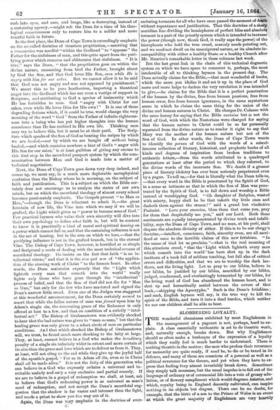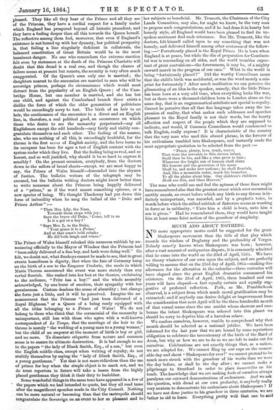SLOBBERING LOYALTY.
THE wonderful clumsiness exhibited by most Englishmen in the management of a pageant is not, perhaps, hard to ex- plain A class essentially untheatric is set to do theatric work, and, naturally enough, breaks down. But why Englishmen should so often make a burlesque of the expression of a loyalty which they really feel is much harder to understand. There is nothing theatric in the matter; the men who profess their reverence for monarchy are quite ready, if need be, to die or be taxed in its defence, and many of them are conscious of a personal as well as a political reverence for the throne, and yet when they have to ex- press that feeling they almost invariably break down. Sometimes they simply talk nonsense, but the usual impulse is to fall out of the language of ordinary or of ceremonial life into a vein of greasy adu- lation, or of flowery compliment which would disgrace Asiatics, and which, royalty being in England decently cultivated, can inspire nothing in its objects but disgust. There can be no doubt, for example, that the birth of a son to the Prince of Wales is an event at which the great majority of Englishmen are very heartily
pleased. They like all they hear of the Prince and all they see of the Princess, they have a cordial respect for a family under which England has prospered beyond all historic precedent, and they have a feeling deeper than all this towards the Queen herself.
The reflective among them feel, moreover, that even if England's existence is not bound up with her dynasty, her political prosperity is, that failing a line singularly deficient in collaterals, the balanced constitution of Great Britain would be in the most imminent danger. No one who remembers the extreme emotion felt even by statesmen at the death of the Princess Charlotte will doubt that this dread is a real one, and though the chance of failure seems at present but remote, the security is very often much
exaggerated. Of the Queen's sons only one is married ; the daughters nearest to the succession are married to men who will be sovereign princes, perhaps the circumstance which would most detract from the popularity of an English Queen ; of the Cam-
bridge House, but one member is married, and she has but one child, and against the Cumberland branch there exists a dislike the force of which the older generation of politicians would be exceedingly sorry to test. The birth of an heir to an heir, the continuance of the succession in a direct and an English line, is, therefore, a real political good, an occurrence on which those who desire to see the monarchy perpetuated—say all Englishmen except the odd hundreds—may fairly and visibly con- gratulate themselves and each other. The feeling of the masses,
also, who see nothing of all this, is exceedingly healthful, for the throne is the first nexus of English society, and the love borne to its occupant has been for ages a test of English content with the system under which they live. But the feeling being so real, and so honest, and so well justified, why should it be so hard to express it sensibly P On the present occasion, everybody, from the doctors down to the sellers of broad sheets—except, we are most happy to say, the Prince of Wales himself—descended into the abysses of fustian. The bulletin writers of the telegraph may be excused, but the bulletin writing doctors might know better than
to write nonsense about the Princess being happily delivered of a "prince," as if the word meant something epicene, or a new species of being. We thought Thackeray had put down this form of imbecility when he sang the ballad of the " Duke and Prince Arthur " :—
" Then Mrs. Lily, the Nuss, Towards them steps with joy ;
Says the brave old Duke, Come, tell to us
Is it a gal or a boy ? '
"Says Mrs. L. to the Duke,
' Your grace it is a Prince,' And at that nuss's bold rebuke He did both laugh and wince."
The Prince of Wales himself rebuked this nauseous rubbish by an- nouncing officially to the Mayor of Windsor that the Princess had "been safely delivered of a fine boy, and both were doing well." He felt, we doubt not, what flunkeys cannot be made to.see, that in great events homeliness is dignity, that when the fate of Germany hung on the birth of a son to the Emperor Frederic, the mode in which Maria Theresa announced the event was more stately than any verbal flourish. She rushed into her box at the theatre, exclaiming to the audience, "Fritz has a boy!" and the whole assembly acknowledged, by one burst of emotion, their sympathy with her genuineness. Custom deadens the sense of absurdity ; but change the form just a little, and it will be perceived. Imagine the an- nouncement that the Princess "had just been delivered of a Royal Highness," or a Queen of a being ready equipped with all the titles belonging to a Prince of Wales ! We do not
belong to those who •think that the ceremonial of the monarchy is unimportant, still less with those who agree with a well-known -correspondent of Le Temps, that the marriage of the heir to the
throne is merely " the wedding of a young man to a young woman," but the child of an emperor at the moment of birth is boy or girl, and no more. To dissociate etiquette from nature and common sense is to ensure its ultimate destruction. It is bad enough to see
in the papers " the lady of Blank Smith, Esq., of a son," but even the -English middle class, except when writing of royalty, do not
stultify themselves by saying the " lady of Blank Smith, Esq., of a young gentleman." Yet that is not more ridiculous than the use of prince for boy when the simple object is to mark sex, and we do trust reporters in future will take a lesson from the highly placed gentleman they think it their duty to beslobber.
Some wonderful things in the same tone have appeared in a few of the papers which we had intended to quote, but they all read tame after the magnificent speeches made in the City Council. Nothing can be more natural or becoming than that the metropolis should congratulate the Sovereign on an event to her so pleasant and to her subjects so beneficial. Mr. Truscott, the Chairman of the City Lands Committee, may also, for aught we know, be the very man to propose such congratulations, and if he had done it in hearty but homely style, all England would have been pleased to find its un- spoken sentiment find such utterance. But Mr. Truscott, like the doctors, felt himself called upon to say something that was not homely, and delivered himself among other sentences of the follow- ing :—" Fortuitously placed is the Royal Prince. He is born when England is at peace, but while the din of preparation for Continen- tal war is resounding on all sides, and the world trembles expec- tant of great convulsions—the forerunners, it may be, of a mighty onward march in the progress of our race." What in the world is being "fortuitously placed ?" Did the worthy Councilman mean that the child's birth was accidental, or was the word merely a mis- print for fortunately ? After much meditation we can perceive the glimmering of an idea in the speaker, namely, that the little Prince has been born at a very odd time, when everything looks like war, but as there were a thousand children born in London alone on the same day, that is an ungrammatical attribute not special to royalty.
Cannot he perceive that all that fine language takes away the im- pression of reality, that what makes such addresses and speeches pleasant to the Royal family is not their words, but the hearty affection and respect of the people which they are supposed to indicate, and would, if Common Councilmen would condescend to talk English, really express ? It is characteristic of the country that the very man who used this absurd phrase, in the fervour of his enthusiasm tumbled into Shakespeare, and instantly made the
most appropriate quotation to be selected from the poet :— "Peace, plenty, love, truth, terror, That were the servants to this chosen infant, Shall then be his, and like a vine grow to him ; Wherever the bright sun of heaven shall shine His honour and the greatness of his name Shall be, and make new nations; he shall flourish, And, like a mountain cedar, reach his branches
To all the plains about him. Our children's children Shall see this, and bless Heaven."
The man who could see and feel the aptness of those lines might have remembered also that the greatest event which ever occurred in earthly annals, an event before which any birth to any throne is in- finitely unimportant, was recorded, and by a prophet's voice, in words before which the stilted rubbish of flatterers seems as wanting in force as in sublimity, " Unto him a child is born, unto him a son is given." Had he remembered them, they would have taught him at least some faint notion of the grandeur of simplicity.































 Previous page
Previous page